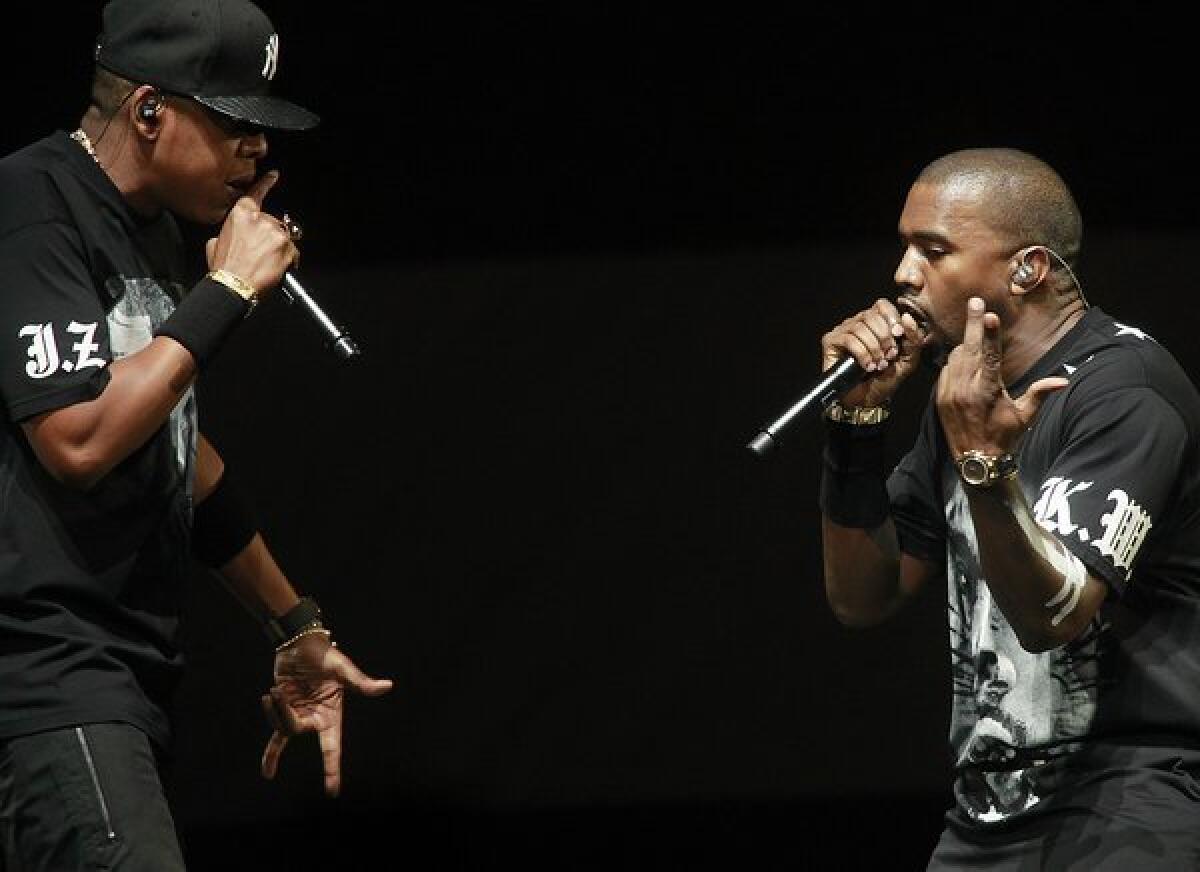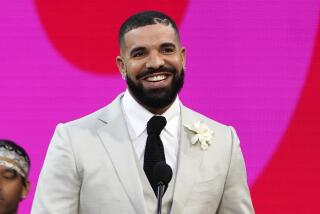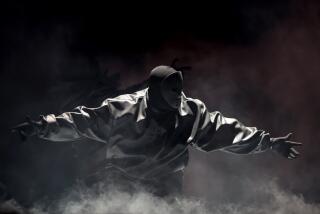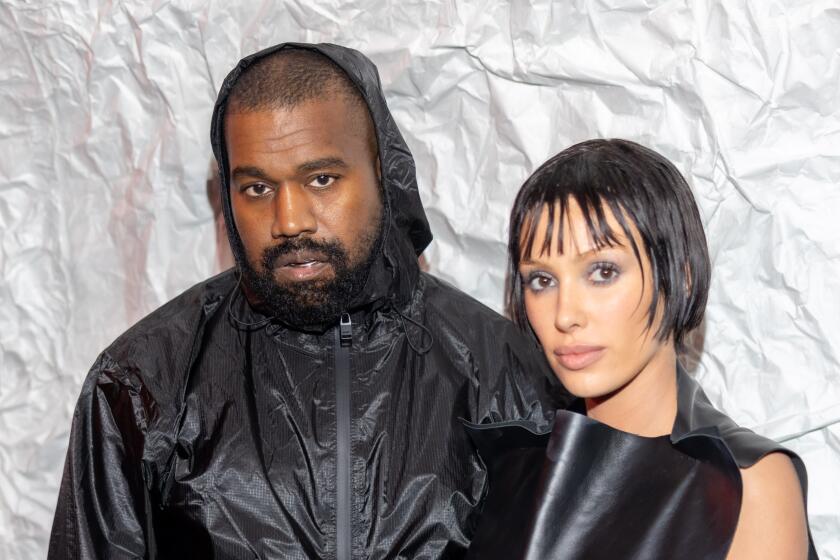Jay-Z and Kanye West: Are they out of ideas of their own?

Last week, producer Hudson Mohawke — a centerpiece of Kanye West’s extended crew and a producer on “Yeezus” — said something that almost no other producer peer was willing to. He thought the new Jay-Z album didn’t sound all that exciting.
“This record could’ve came out 10 yrs ago n no one wouldve batted an eye lid,” he wrote on Twitter. In a followup reply to the producer Mike Dean, he added: “Not negativity just honest opinion I think it’s lazy, just my own opinion. Not hating.”
Plenty of fans chimed to support Mohawke, with the droll Flying Lotus mock-chiding him that “hey hey. Ur famous now. U not allowed to b honest no more.” Dean, for his measure, ominously warned Mohawke that he was screwing up his chances to make beats for “Watch the Throne 2.”
PHOTOS: Celebrities by The Times
Jay’s recent collaborations in the performance-art world (like playing his Jeff Koons and George Condo-riffing single “Picasso Baby” for six hours at New York’s Pace Gallery) imply he’s not lacking for high-art fans. But it’s interesting that Mohawke — now one of mainstream rap’s edgiest and in-demand producers — would feel comfortable calling the new album from hip-hop’s corporate titan “lazy” and wanting “beats in general (that) dont sound like 2003.”
Is it because these young producers know that the older guard needs the credibility of other, more challenging artists more than ever?
In a recent bomb-chucking piece on Grantland, Sean Fennessey suggests that Jay-Z and Kanye West have both essentially become vampires of other, vital underground sounds and aesthetics. This isn’t a new thing in pop music — go ask Carole Kaye who really played the bass lines on “Pet Sounds,” or the Funk Brothers about who forged the Motown sound.
But as the Internet underground churns out an astonishing amount of interesting, evolving hip-hop, kingpins like West and Jay are left in a tough predicament. They know they live on a musical and capitalist Mt. Olympus full of fine paintings, wine and women and are happy to tell you about it.
But it’s also kind of telling that the most notable conversation points about each of their new records were a Samsung affiliation and the fact that Kanye admitted he barely even tried at all in writing about half the album.
RELATED: Best albums of 2013 so far | Randall Roberts
If that’s what it means to be a god, being a god sounds kind of boring and unrewarding.
Maybe that’s why each of them have taken their generally acknowledged “coolest guys on the planet” reputations and latched onto others who are doing arguably more interesting actual work.
It’s a smart move. When Jay-Z raps “Picasso Baby” to Marina Abramovic and the art critic Jerry Saltz for six hours, it’s hard not to feel smitten and bit jealous.
But then one remembers Kanye already tried a similar concept at the release of “My Beautiful Dark Twisted Fantasy,” where he hosted an album playback amid a Vanessa Beecroft performance piece with dozens of nude models.
And then you remember a few years ago when Jay put out an “Occupy”-themed T-shirt for profit in the thick of the street protests. And then you pull up the “Watch the Throne” video for “No Church in the Wild” that evokes Arab Spring revolutions, on an album that’s fundamentally about having bankrolls and lifestyles befitting a cynical Middle East oil titan.
And then you go listen to “Yeezus,” which after a few weeks still sounds unimpeachably progressive, with an impeccable roster of noise-rap and electronica producers. But then notice just how far behind Kanye’s knuckleheaded lyrics about sweet-and-sour sauce sex are, by comparison, to the record’s searing sonics. Note how absurd a pairing of “Strange Fruit” and his complaints about being persecuted by money-hungry women is in hindsight.
TIMELINE: Summer’s must see concerts
Almost everything that’s genuinely “cool” about these new albums comes from a reflection of someone else’s vision. Rap is built on smart curation and collaboration, and having a deft ear for a novel sample or lyrical allusion is an artist’s stock and trade.
But like a lot of the contemporary art they collect and name-drop on record, these albums get much of their worth from their associations — with money, with reputation, with taste, with youth and their experiments — rather than what original things they actually have to say.
Much of the conversation about the production on Jay-Z’s “Magna Carta” is about how the 16-year-old Canadian producer Wondagurl earned a credit on it, and thus probably changing her life forever with the blessing of rap’s titans.
But maybe it’s the reverse. I’d bet Jay and Kanye know, deep in their true artists’ hearts, that all the Samsung money on Earth can really buy you is proximity to other people’s good ideas. And the young blood they’re tapping to get there might finally be ready to call them out on it.
ALSO:
Review: Jay-Z’s ‘Magna Carta Holy Grail’ full of empty boasts
Review: Kanye West’s wildly experimental, narcissistic ‘Yeezus’
This week’s on-sales: The Weeknd, Rascal Flatts, Epicenter and more
More to Read
The biggest entertainment stories
Get our big stories about Hollywood, film, television, music, arts, culture and more right in your inbox as soon as they publish.
You may occasionally receive promotional content from the Los Angeles Times.






